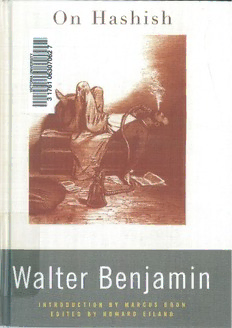Table Of ContentOn Hashish
-
On Hashish
Walter Benjamin
Translated by Howard Eiland and Others
WITH AN INTRODUCTORY ESSAY BY MARCUS BOON
scanned by Daniel LeBlanc
THE BELKNAP PRESS OF HARVARD UNIVERSITY PRESS
Cambridge, Massachusetts & London, England
2006
Copyright© 2006 by the President and Fellows of Harvard College
All rights reserved
Printed in the United States of America
Additional copyright notices and the Library of Congress cataloging-in-publication data
appear on pages 181-183, which constitute an extension of the copyright page.
,,
Contents
Translator's Foreword vu
Abbreviations and a Note on the Texts xiu
"Walter Benjamin and Drug Literature," by Marcus Boon 1
Editorial Note, by Tillman Rexroth 13
Protocols of Drug Experiments (1-12) 17
Completed Texts
"Myslovice-Braunschwei Marseilles"
g-- I05
"Hashish in Marseilles"
n7
Addenda
From 129
One-Way Street
From "Surrealism" 132
From "May-June 1931" 135
From 136
The Arcades Project
From the Notebooks 142
From the Letters 144
''An Experiment by Walter Benjamin," by Jean Selz 147
Notes 159
Index 171
Translator's Foreword
THE DRUG EXPERIMENTS documented in this volume took place
in the years 1927 to 1934 in Berlin,M arseilles,a nd Ibiza.A long with
Walter Benjamin, the participants included, at various times, the
philosopher Ernst Bloch,t he writer Jean Selz,t he physicians Ernst
Joel, Fritz Frankel, and Egon Wissing, and Egon's wife Gert
Wissing.O riginally recruited as a test subject by Joel and Frankel,
who were doing research on narcotics,B enjamin experimented with
several different drugs: he ate hashish,s moked opium,a nd allowed
himself to be injected subcutaneously with mescaline and the opiate
eucodal.R ecords of the experiments-they were very loosely orga
nized-were kept in the form of drug "protocols." Some of these ac
counts were written down in the course of the experiments,w hile
'
others seem to have been compiled afterward on the basis of notes
and personal recollection.B enjamin also took hashish in solitude,a s
witness the three accounts of an intoxicated evening in Marseilles.
He took these drugs,w hich he looked on as "poison, "for the sake of
the knowledge to be gained from their use.A s he said to his friend
Gershom Scholem in a letter ofJanuary 30,1 928," The notes I made
[concerning the first two experiments with hashish] ...m ay well
turn out to be a very worthwhile supplement to my philosophical ob
servations,w ith which they are most intimately related,a s are to a
vii
Translator's Foreword
certain extent even my experiences under the influence of the drug."
As an initiation into what he called "profane illumination," the drug
experiments were part of his lifelong effort to broaden the concept of
experience.
During those last years of the Weimar Republic, Benjamin was
meditating a book on hashish-a "truly exceptional" study, he tells
Scholem-which, however, remained unrealized, and which he came
to consider one of his large-scale defeats. No doubt this book would
have differed from the loose collection of drug protocols and fe uille
ton pieces published posthumously in 1972 under the title Uber
Haschisch, and reprinted in 1985, slightly emended and expanded,
in Volume 6 of Benjamin's Gesammelte Schriften (Collected Writ
ings), source of the present translation. Although we have nothing
to indicate specific plans in this regard, it is tempting to think of
the drug protocols as a detailed blueprint for the construction of
the projected volume; despite their fragmentary character, they artic
ulate the gamut of motifs with which the book might well have
been concerned. They are in fact highly readable texts, those by
Benjamin's colleagues-in which he is described and quoted-no less
than his own, and their documentary notebook quality is not un
related to the "literary montage" of some of Benjamin's more im
portant later works, such as The Arcades Project (into which he incor
porated passages from the protocols) and "Central Park." The
notational style, moreover, is a reflection of the discontinuous and as
it were pointillistic character of the drug experiences themselves,
which Benjamin likens to a "toe dance of reason."
The philosophical immersion that intoxicants afforded Walter
Benjamin was not Symbolist derangement of the senses, then, but
Vitt

